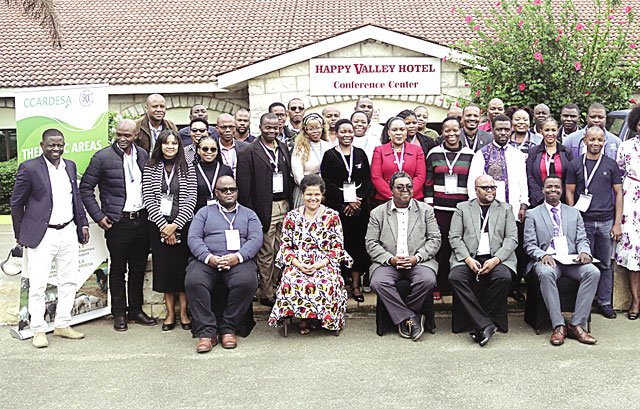By Nomthandazo Nkambule | 2018-05-17
COMMUNITY leaders in the country are keen to work with the Southern Africa HIV and AIDS Information Dissemination Service (SAfAIDS) in advocating for the rights and inclusion of key populations (KPs). On Monday, SAfAIDS engaged about 33 community leaders from Ezulwini, Matsapha, Manzini and Kwaluseni in a dialogue. They included bucopho, community police, bandlancane, rural health motivators, ward councillors and others. According to SAfAIDS, engaging community leaders was part of the deliverables of the KP Reach programme, which is implemented in eight Southern African countries and Eswatini is also included. The others are Zimbabwe, South Africa, Malawi, Lesotho, Zambia, Botswana and Namibia. The KP Reach programme funded by Hivos is aimed at contributing to a strengthened key population response to HIV. “The project objectives include strengthening four emerging regional networks in Southern Africa so that they work strategically and efficiently together and with others to contribute to effective development, monitoring and reporting of HIV prevention, testing and treatment services, programmes and policies for key populations at regional and national levels.” SAfAIDS noted that community leaders during the Monday engagement appreciated the dialogue as they viewed it as an eye-opener. The community leaders made an undertaking that back in their respective community, they will be advocating for the rights and inclusion of KPs. KPs are people who inject drugs, men who have sex with men, transgender persons, sex workers and prisoners. Around the world, KPs face much higher rates of HIV and AIDS than the general population and are most at risk of contracting HIV. “They vowed to go back and change their communities in as far as they view the KP community. They appreciated learning about human rights and inclusiveness of the key populations and further recommended that the ministry of health, in collaboration with SAfAIDS, must take such discussions to the community level (to the groups they serve). The leaders further requested key populations to participate in community meetings in the imphakatsi, wards, tinkhundlas,” SAfAIDS added that the overall objectives of the KP Reach programme was to sensitise community leaders on creating an enabling environment for improved access to services by key populations, and shifting attitudes and beliefs for reduction of stigma and discrimination as a barrier to HIV testing, treatment and care for key populations and vulnerable groups. SAfAIDS said through the project six ‘Key Population Champions’ in different sectors namely traditional, health, political, justice had been trained to advocate for equal access to services by key populations. This follows a global call that service uptake on HIV and AIDS should reach 90:90:90 by 2025. Based on documented reports and studies, KPs are stigmatised and discriminated in accessing health services and are as a result, they are dying in great numbers, and this reverses the gains of the past efforts in the fight against HIV and AIDS. In the Kingdom of Eswatini, six champions had been trained to understand issues affecting key populations in order to lead activities towards reduction of stigma and discrimination. They are Khanyisile Lukhele and Strydom Mpandza in the health sector (Swaziland National AIDS Programme), Somntongo Member of Parliament (MP) Sandile Nxumalo in the political sector, Zwanini Shabalala in the religious sector, Magistrate Phathaphata Mdluli in the justice sector and Maswati Dludlu in the culture and media sectors. Ministry of health’s Khanyisile Lukhele said their goal was to ensure universal access to quality and non-discriminatory health services to all members of the Swazi population and to sstrengthen coordination among stakeholders and enhance organisational capacity to effectively deliver comprehensive services for key population. There were testimonies from parents who have children under key populations. One of the parents said; “this was a journey, acceptance was a very big issue. at first I condoned the behaviour such that my child had to move out of my home.” The parent added that with time she got to understand her child through information she learnt on key populations.
share story
Post Your Comments Below

Status Capital Building Society shareholders are once again being asked to take part in an audaci...

Eswatini along with many other African nations is under scrutiny for failing to meet its commitme...

BEAUTY Pageant Eswatini Chairman, Sandra Ismail, officially passed over the Miss Eswatini title t...

SOCCER - LIVING on borrowed time!
For the first time in history of local football, two of...
All material © Swazi Observer. Material may not be published or reproduced in any form without prior written permission.
Design by Real Image Internet